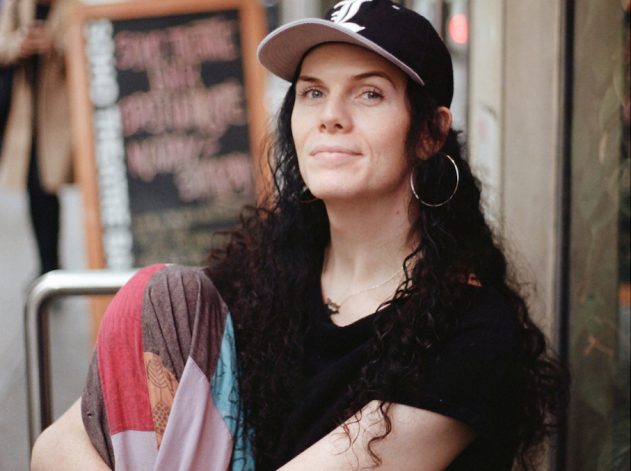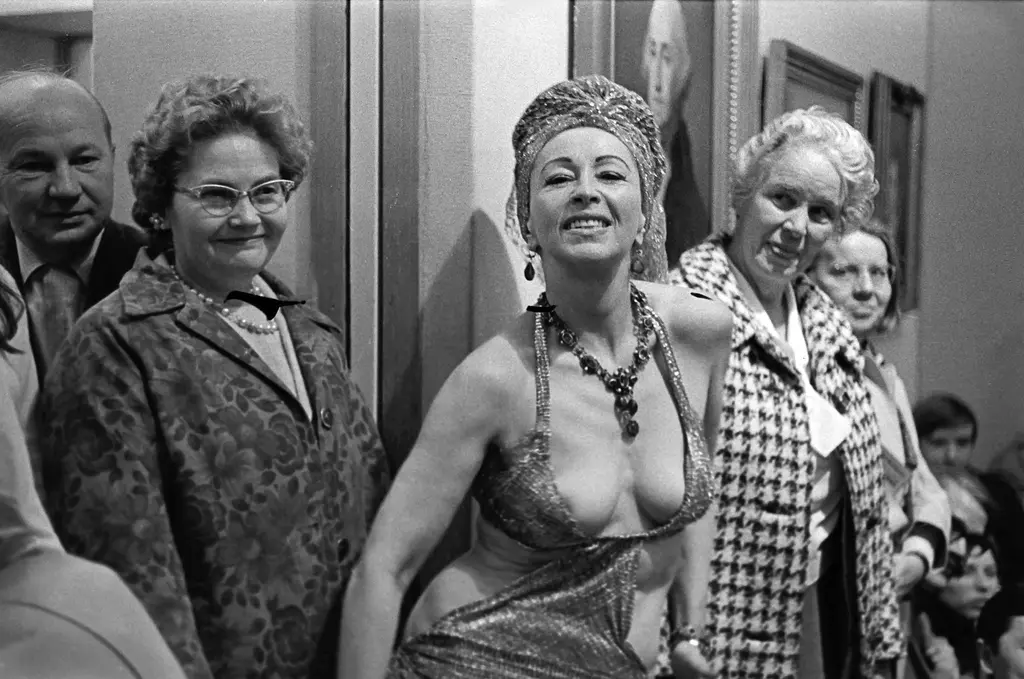’For transgender people, existing is a protest’
- Text by Ben Smoke
- Photography by Issey Gladston

“It’s nice to have the authority to perform a transgender character that’s not palatable.”
Jordan Gray smiles wryly as she wraps her arms around her legs and pulls them to her chin. We’re sat in a booth at the Soho Theatre bar talking about her 2018 Comedy Central web series Transactions, which has recently been acquired for TV development by Simon Pegg and Nick Frost. Gray, who writes the show, also stars as Liv, a trans supermarket worker who, it would be fair to say, embodies the term unpalatable. The memorable ending of one episode of the web series sees her urinate over the car of a colleague. “Here you are Linda, cheeky little car wash,” Liv exclaims before musing, “don’t you just hate it when you get splashback on your tits?”.
“A lot of transgender people you see portrayed in the media are either suffering saintly characters that can’t do any wrong, or they’re an over-sexualised villain” Gray tells me in her trademark Essex accent. “Both characters are very two-dimensional. Most people are a bit of a bellend, myself included, so it’s nice to play a character that’s transgender, that also happens to be a bit of a bellend. It’s nice to play a character that has a bit of light and shade because it’s so much more relatable!”
In many ways, Gray’s Liv is a breath of fresh air. A tonic to that two-dimensionality that she speaks of. A way of making space for trans stories that more closely reflect the breadth of the experience. She’s a character that Gray hopes, given the space of full length episodes, audiences will come to love. I ask whether she ever worries about putting these complex characters, these true and often challenging expressions of transness into a world that is so explicitly hostile.
“I’ll give humanity the benefit of the doubt 100% of the time and I’m happy to always be disappointed, which has been my experience thus far” she tells me, the sides of her mouth drawing up into a smile. “Most people are amazing, and a small sliver are quite upset and angry.”
A couple of weeks before our chat, Gray performed on Channel 4’s Friday Night Live. Her closing act saw that small sliver of people get very upset and very angry. The performance saw Gray take to the stage and perform her song Better Than You. In the number she explains, over the course of several minutes, why she is better than everyone else. As the song reaches it’s crescendo she stands shouting, “What I love about live TV is that I get to do stupid shit like this!” before ripping off her fluorescent pink suit and finishing the song by playing the piano with her penis, her breasts (made of “the same material they use for insulation on the space station!”) also exposed for all to see.
The performance led to 1600 Ofcom complaints (which were not upheld) and a barrage of visceral hate directed at Gray. Piles of comments outraged by the nudity but also the content of the song – how dare Jordan say she’s better than a woman?!


“The song is quite clear” she explains, tongue pressed firmly in her cheek. “I’m saying I’m better than everyone. Every man, woman, child and everything else. Even newborn babies. It’s not specific to them at all. But the thing is if you’re geared up and ready to cast yourself in the role of a put upon or a disenfranchised person, you’re going to take every opportunity to feel that identity.” There are layers of irony to Gray’s performance, which is lifted from the end of her show Is It A Bird. The title, more irony, playing on her love of superheroes, her Essex roots and her trans identity. This summer she took the show up to Edinburgh where it received rave reviews and sold out. She brought it down to Soho Theatre for a sell out run in autumn and will be back in December for another two week run.
We talk more about the backlash from the Friday Night Live performance and move on to her performance at the London Palladium a week later. At the show, which saw her become the first trans performer to headline the venue solo, the security presence was “ridiculous” in response to the deluge of death threats she received. Gray confesses she googled whether the silicone in her breasts would stop a bullet. The search was inconclusive and, mercifully, entirely unnecessary as the show went off without a hitch. We laugh and joke on the topic, ridiculing the lack of effort put into many of the threats, but it’s hard to escape the reality of it. In 2022, a venue was forced to hire a vast number of security guards to protect a woman simply for having the audacity to perform. In many ways, Gray admits, “being transgender and existing is a protest”.
The death threats, however, were dwarfed by the messages of support and love the comic received, many from those seeing their bodies represented on screen for the first time.


“It was important to me that people saw their own bodies or bodies of people they know, not as part of some buzzfeed article about someone being murdered,” Gray says of the act. “It feels important for younger people who have just transitioned to see their body portrayed, not in a situation that’s controlled by a man or anyone.” she adds, musing on the nature of the representation of trans bodies “in the porn everyone pretends not to watch”.
There is a confrontational element to so much of her work that seems, to a certain extent, to take Gray by surprise when I posit it to her. That’s not to say the comic is naive or blissfully unaware, rather she manages to have an almost conscious detachment from the expectation of hate or backlash that paralyses so many of us.
“I just don’t predict anything like that,” Gray tells me as we talk more on the Ofcom complaints. “Maybe that’s the only reason I’m able to do it, because actually I just assume everythings always going to be fine because I think life’s nice”.
For Gray, life is nice right now. Our chat comes straight after she just recorded a new episode of her podcast Transplaining with hip-hop artist Scroobius Pip. She’s gearing up for her next run at Soho Theatre before taking the show across the world next year, all whilst writing and working away on development for Transactions. It has been a seismic few months for the comic who has been very much in the ascendancy since her Edinburgh run.


As with many overnight success stories, the acclaim and attention is the result of years of work and toil. Gray is busier than ever, barely getting time to see her wife, who she “likes quite a lot” and lives with in Southend. Her explosion comes at a time when the landscape for trans people in this country, and indeed across the world, only seems to be getting more hostile with every passing day.
She represents so much, for so many. A working class trans woman who injects her performance and her craft with colloquialism and class consciousness. I ask her whether she’s had time, in amongst it all, to really grapple with what she means to people. “It’s a responsibility to know what I’m doing for other people. That’s a really lovely question because it’s so important and no, I haven’t even begun to so I must make time for it.”
At her core Jordan Gray is a wickedly funny comic, a rising star whose dedication to meeting people where they are – “You won’t find any words in my show that most people don’t know because what’s the point in tripping people up before you’ve even begun?” – is as important to her as her commitment to portraying trans people in their entirety, warts and all.
Jordan Gray’s Is it a bird? returns to Soho Theatre in December.
Transplaining with Jordan Gray is available here.
Ben Smoke is Huck’s Commissioning Editor. Follow him on Twitter.
Enjoyed this article? Like Huck on Facebook or follow us on Twitter and Instagram.
You might like

Remembering New York’s ’90s gay scene via its vibrant nightclub flyers
Getting In — After coming out in his 20s, David Kennerley became a fixture on the city’s queer scene, while pocketing invites that he picked up along the way. His latest book dives into his rich archive.
Written by: Miss Rosen

On Alexander Skarsgård’s trousers, The Rehearsal, and the importance of weirdos
Freaks and Finances — In the May edition of our monthly culture newsletter, columnist Emma Garland reflects on the Swedish actor’s Cannes look, Nathan Fielder’s wild ambition, and Jafaican.
Written by: Emma Garland

Capturing life in the shadows of Canada’s largest oil refinery
The Cloud Factory — Growing up on the fringes of Saint John, New Brunswick, the Irving Oil Refinery was ever present for photographer Chris Donovan. His new photobook explores its lingering impacts on the city’s landscape and people.
Written by: Miss Rosen

Susan Meiselas captured Nicaragua’s revolution in stark, powerful detail
Nicaragua: June 1978-1979 — With a new edition of her seminal photobook, the Magnum photographer reflects on her role in shaping the resistance’s visual language, and the state of US-Nicaraguan relations nearly five decades later.
Written by: Miss Rosen

A visual trip through 100 years of New York’s LGBTQ+ spaces
Queer Happened Here — A new book from historian and writer Marc Zinaman maps scores of Manhattan’s queer venues and informal meeting places, documenting the city’s long LGBTQ+ history in the process.
Written by: Isaac Muk

Nostalgic photos of everyday life in ’70s San Francisco
A Fearless Eye — Having moved to the Bay Area in 1969, Barbara Ramos spent days wandering its streets, photographing its landscape and characters. In the process she captured a city in flux, as its burgeoning countercultural youth movement crossed with longtime residents.
Written by: Miss Rosen